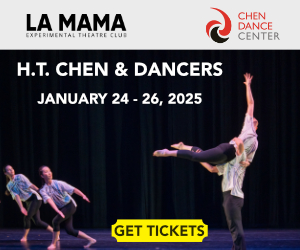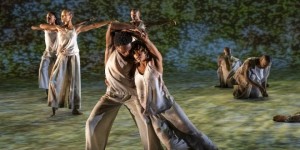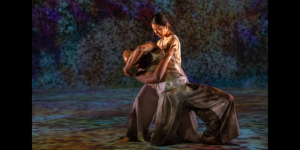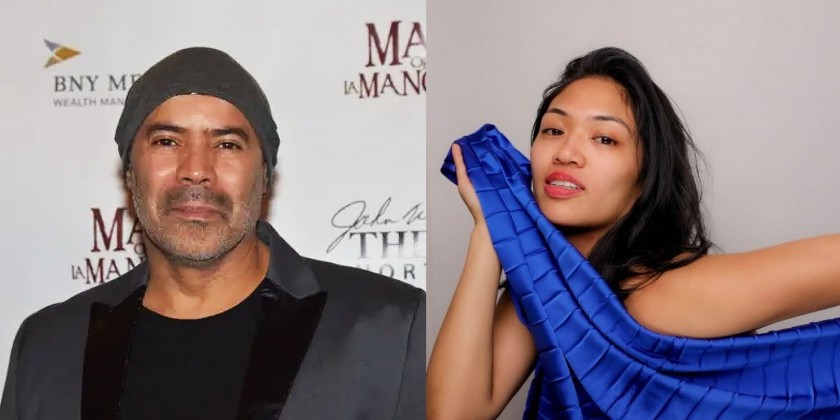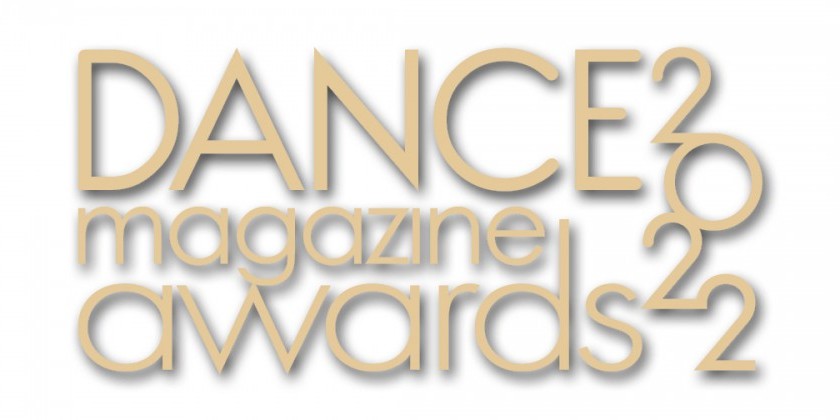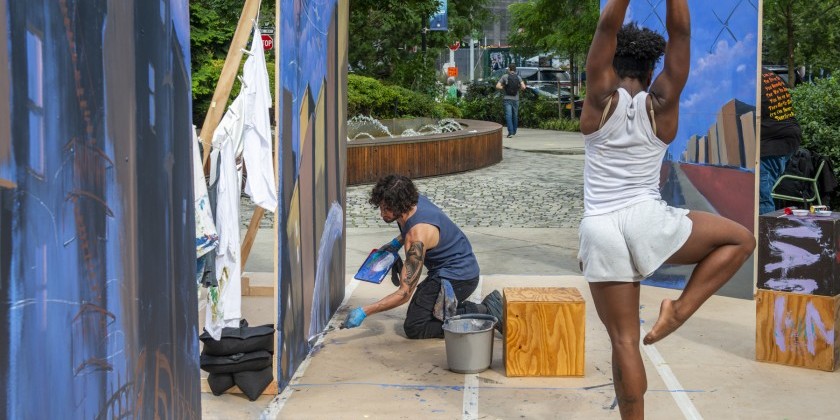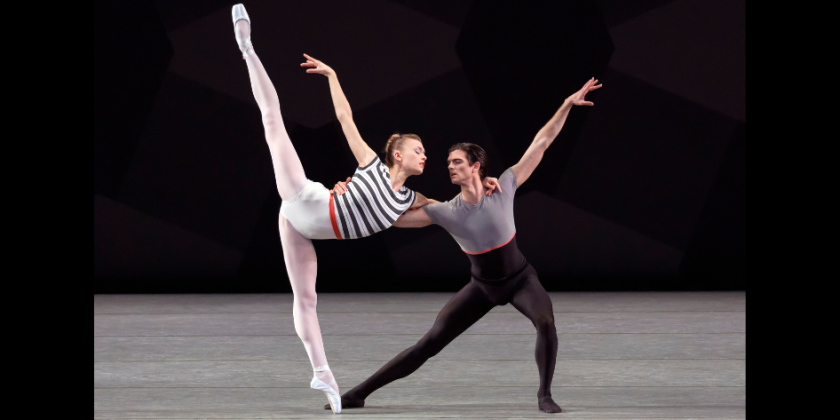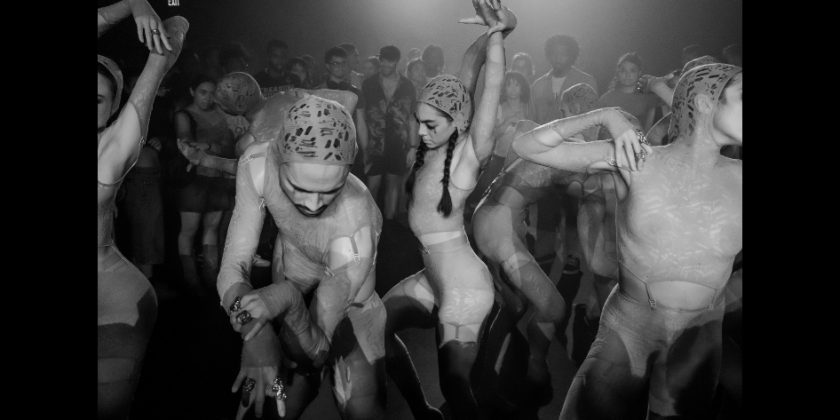IMPRESSIONS: A.I.M. by Kyle Abraham at The Joyce Theater
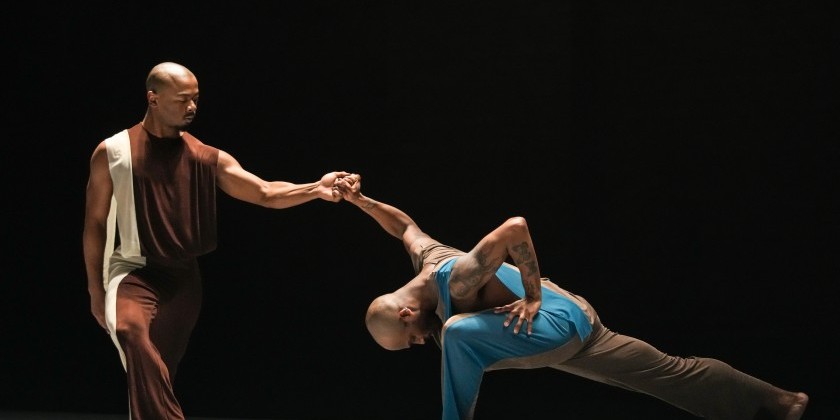
With Guest Choreographers Bebe Miller and Maleek Washington
Performance Date: Saturday, April 8
Artistic Director: Kyle Abraham
Guest Choreographers: Bebe Miller and Maleek Washington
Dancers: Jamaal Bowman, Tamisha A. Guy, Keerati Jinakunwiphat, Catherine Kirk, Jae Neal, Donovan Reed, Martell Ruffin, Dymon Samara, Kar’mel Antonyo Wade Small, Keturah Stephen (swing), Gianna Theodore
Guest Dancers: The Glorya Kaufman School of Dance at USC Class of ’24: Ashton Benn, Aimee Brotten, William Okajima, Hayden Rivas
Lighting Designer: Dan Scully
Costume Designers: Kyle Abraham, Bones Jones, Reid & Harriet, Karen Young, Muriel Stockdale (recreated by Jon Taylor)
Is it possible for dance to excite and soothe simultaneously? Kyle Abraham, artistic director of Abraham in Motion (A.I.M.), executed exactly this idea at The Joyce Theater, where he presented an evening of his original works with additions from choreographers Maleek Washington and Bebe Miller. Abraham’s dances, many collaboratively choreographed with A.I.M., own a distinct fluidity that reflects his personality: warm, welcoming, soulful, and touching. To see an artistic leader who is so incredibly humble yet extremely secure in artistic choice and delivery is enlightening. Every piece Abraham presents speaks to someone in the audience: whether it be regarding power, tenderness, detachment, or love.

A.I.M. opened with Uproot: love and legacy, choreographed by Washington in collaboration with the company. As an A.I.M. alumnus, Washington owns many distinct choreographic credits, including being nominated and named a Princess Grace Awardee for Choreography in 2022 by Abraham. Washington set the stage with a simple, willowy ambience of trees and grass. Peaceful and soothing, dancers Tamisha A. Guy and Jamaal Bowman take the stage, actively observing each other. Eventually Catherine Kirk joins them, exiting to introduce Gianna Theodore and Donovan Reed. The dancers move as if truly outdoors; limbs and spine rippling in a soft breeze. Every solo, duet and trio connect to the earth with liveliness and meaningful elegance. Beautiful vocals complement undulating piano scores composed and performed by KAMAUU and Kwinton Gray. Certain audience members did not realize the accompaniment was live until the musicians took their bow; somehow they were completely mesmerized by Washington’s creation and by how magnificently the vocals echoed.
.jpg)
5 Minute Dance (You Drivin’?) is a three-way collaboration between Abraham, A.I.M., and The Glorya Kaufman School of Dance at USC Class of ’24. Half of the Joyce run was performed by A.I.M., the other half by Glorya Kaufman School student artists Ashton Benn, Aimee Brotten, William Okajima, and Hayden Rivas. The entire performance is danced in sets of duets, perfectly matching in attire, energy, and movement. 5 Minute Dance (You Drivin’?) stretches the limits of electricity and conciseness. Fitting in exactly five minutes is an abrupt and dynamic contemporary anthem with synchronous duets which never stop moving. Erupting with sudden leans and kicks, the dancers eat up every foot of the stage. Dan Scully adds an energetic, magnetic lighting design which elevates the atmosphere with color and dynamics. Just as the audience is adjusting to the explosive levels of power and energy, a sudden blackout indicates the end, as if the timer went off on a five-minute clock.
In stark contrast, Motor Rover, choreographed by Abraham in collaboration with A.I.M., is a duet performed by Tamisha A. Guy and Catherine Kirk, in complete silence. Against the exposed brick wall, Guy and Kirk stretch and undulate different body parts, each dancer finding her individual flow. Although never quite symmetrical, Guy and Kirk rely on each other through breath and cues. Audible breath and jumps allow the audience to enjoy an aspect of dance which is commonly masked. As Guy and Kirk return to each other, the piece ends. The audience claps, completely engrossed in the beauty of simplicity and flow.

With elements of Graham contractions and descents to the floor, Kirk executes Bebe Miller’s stylish choreography with simple beauty. She dances Miller’s solo Rain in a bright red velvet dress; the only set is a patch of bright green grass at center. Kirk’s use of wrists, arms, hips, and eyes is mesmerizing and sculpture-like. There is a specific moment when Kirk simply sits on the grass, looking out into the audience. As vocals by Salli Terri in Bachianas Brasileiras No. 5 immerse the theater, a romantic sensation enters Rain. Kirk writes this love letter with her body in cursive movement, spiraling and ascending. Rain was a distinct highlight of the evening. Peacefully concluding, Kirk rolls off the grass and the pad is left illuminated and empty.

Upstage left a group appears dancing to Black is the Color of My True Love’s Hair, all in unison and tenderness, to begin Abraham’s If I Were a Love Song, which premiered in 2021. Composed of six chapters, each narrative is set to Nina Simone’s music and lyrics. Donovan Reed appears in the second chapter, Keeper of the Flame, confident, articulate, and with character. Reed embodies a self-reflexive narrative embracing and rejecting elements of himself. Gianna Theodore delivers expansive floorwork and vulnerability in Little Girl Blue, acknowledging the audience and at times making them gasp as she suddenly jumps and tumbles on the floor. Her expression continuously emulates Simone’s lyrics. The following duets and solos showcase different elements of love. In the duet to Don’t Explain, Jae Neal and Reed grapple with tension and guilt in a pool of light. Martell Ruffin stuns the audience with fast and furious turns in the solo to Wild is the Wind, also offering beautiful extensions and playing with gravity. Guy concludes the work to Images, dancing in a black dress in a pool of light.
Soul-stirring, heartfelt, and empowering, A.I.M. shares a message applicable to everyone: what it means to love. Dance is a professed love language and Abraham creates a script which is a love letter to the art of dance itself.



